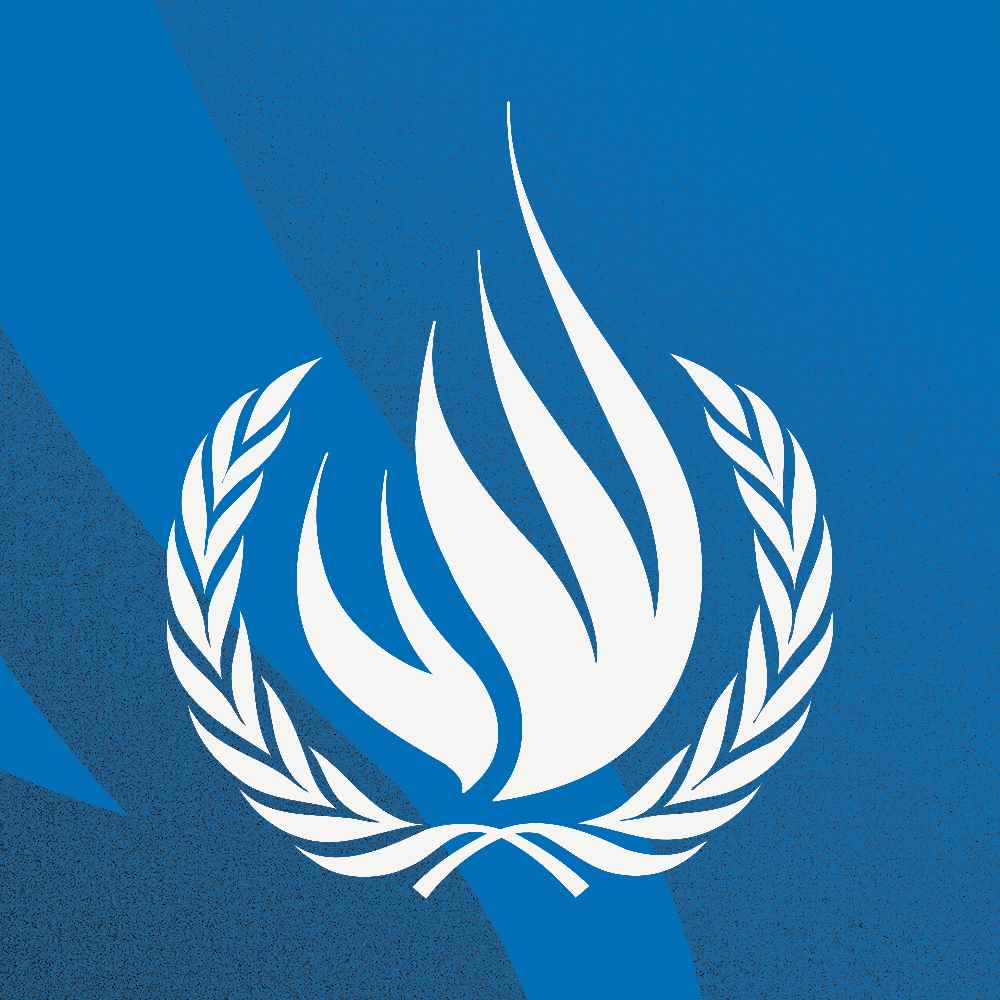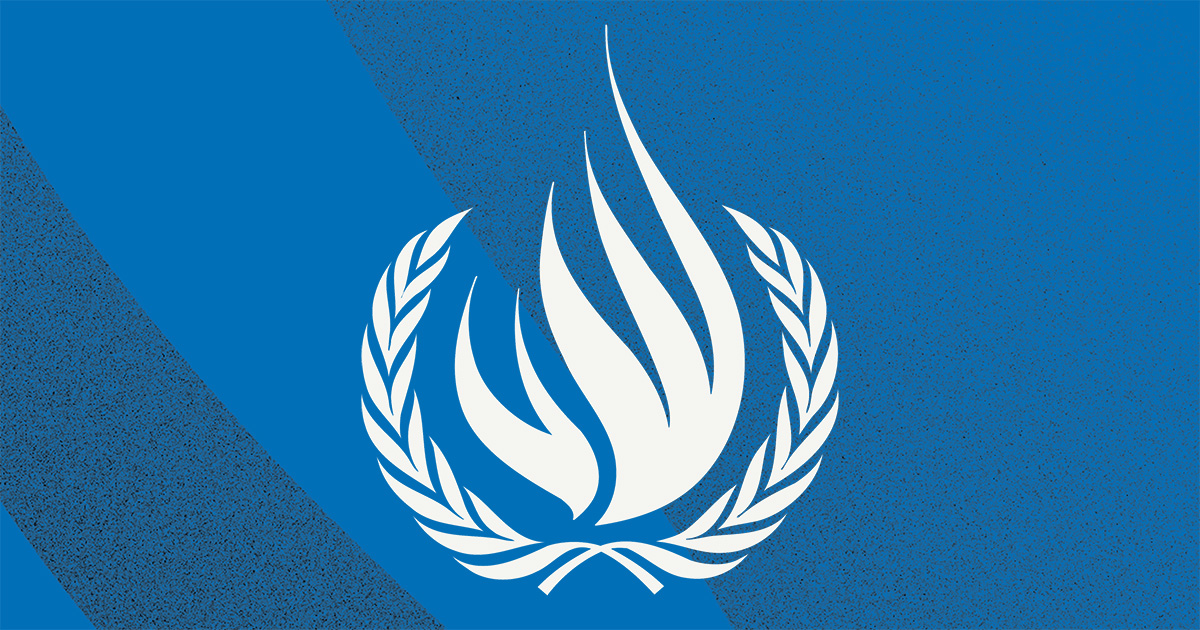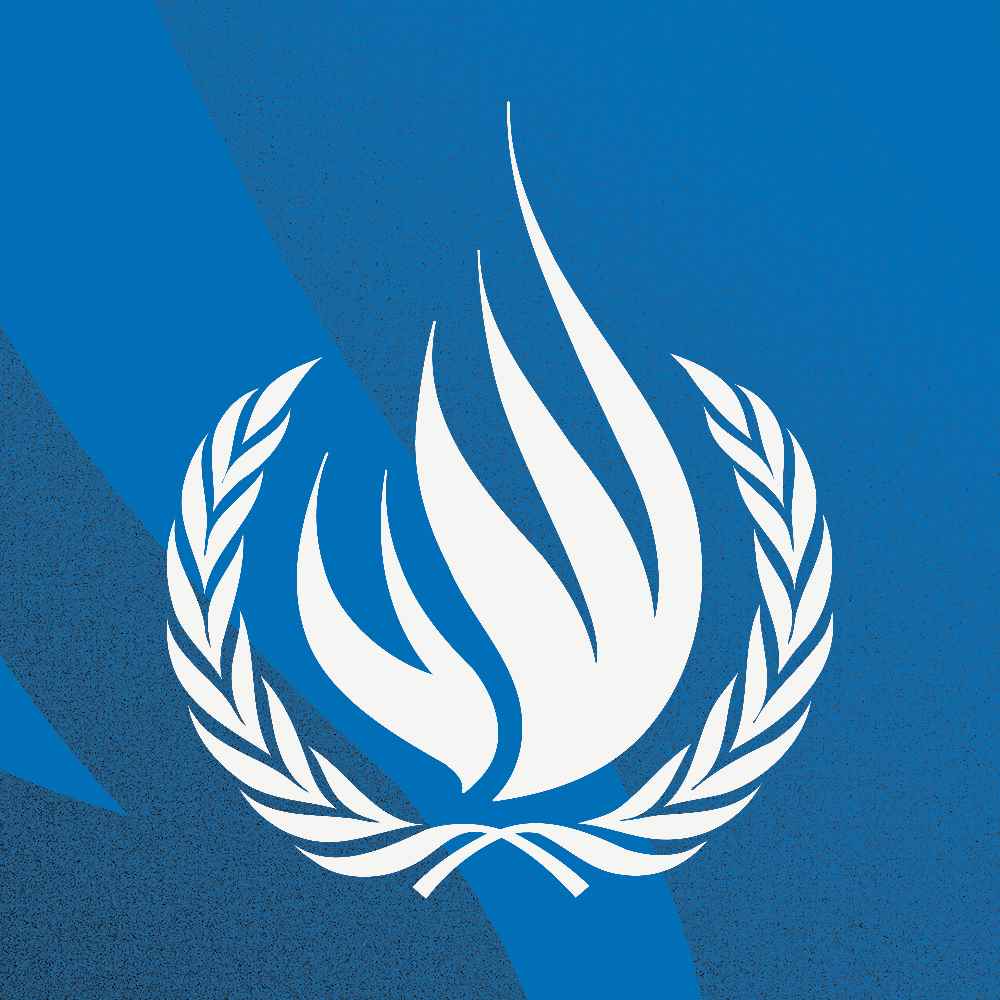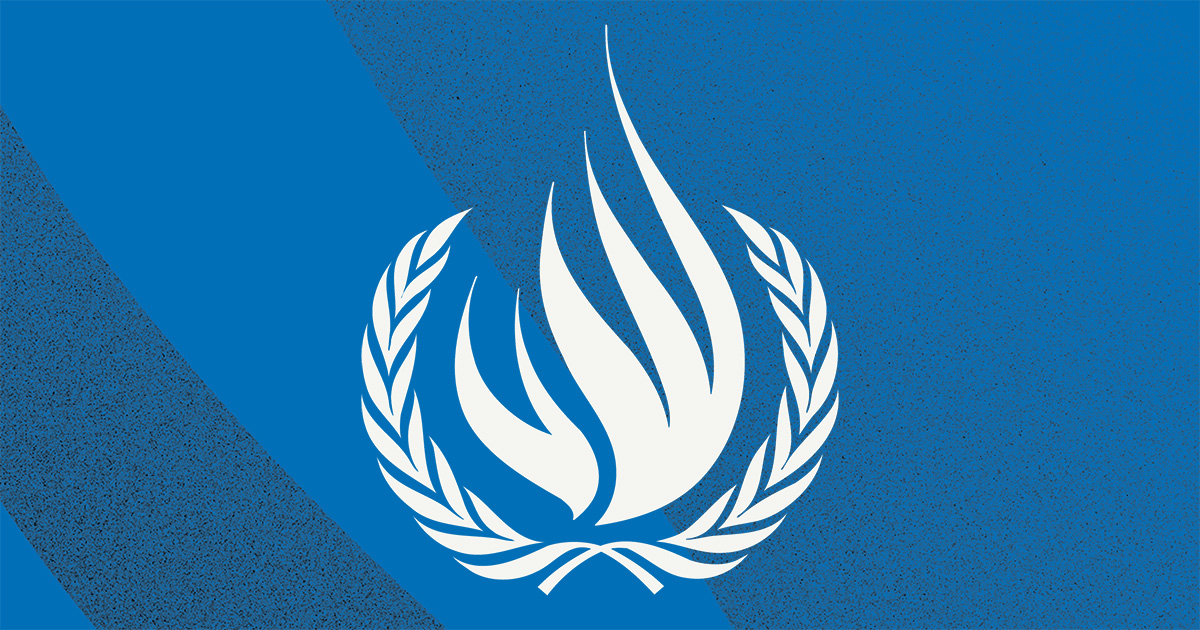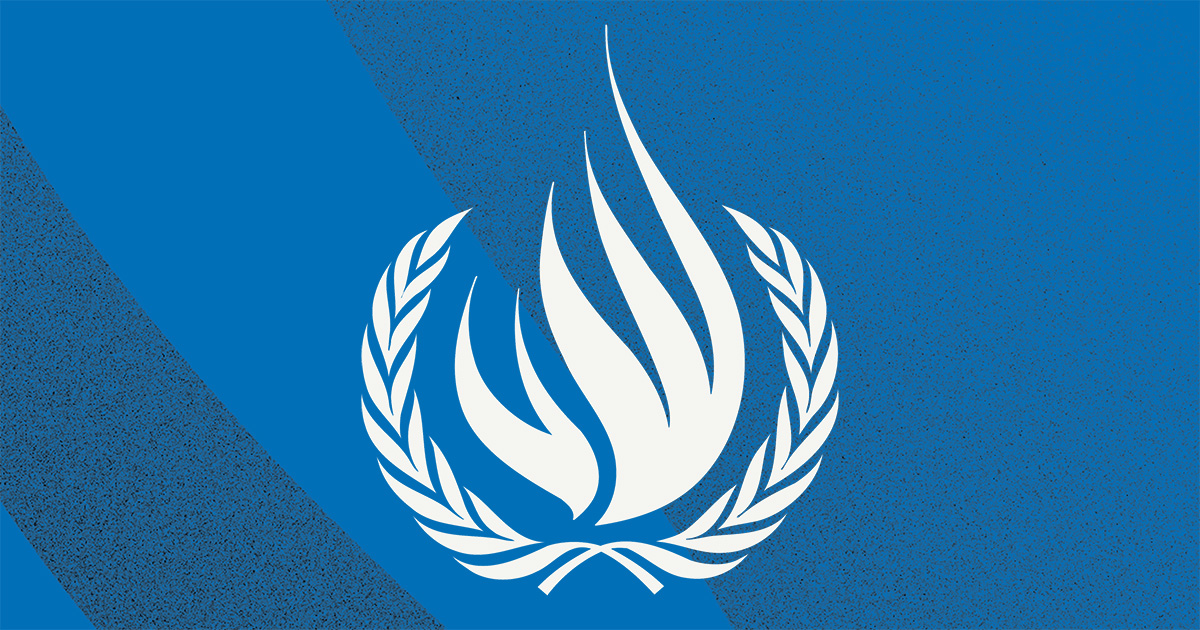
Council Also Adopts Resolutions on Civil Society, Arms Transfers, Nationality, Corruption, the Syrian Arab Republic, the Social Forum and Democracy and Racism
The Human Rights Council this morning adopted 10 resolutions, extending mandates on the independence of judges and lawyers, persons with disabilities, and Belarus. Other resolutions concerned civil society space, the impact of arms transfers on human rights, the right to a nationality, the negative impact of corruption on the enjoyment of human rights, the situation of human rights in the Syrian Arab Republic, the Social Forum, and the incompatibility between democracy and racism.
On the mandate of the Special Rapporteur on the independence of judges and lawyers, the Council decided to extend the mandate of the Special Rapporteur for a period of three years and urged all Governments to cooperate with and assist the Special Rapporteur in the performance of his or her tasks, to consider responding favourably to his or her requests for visits and to consider implementing his or her recommendations.
Concerning the Special Rapporteur on the rights of persons with disabilities, the Council decided to extend the mandate of the Special Rapporteur on the rights of persons with disabilities for a further period of three years, with a mandate to identify, exchange, promote and disseminate good practices relating to the realization of the rights of persons with disabilities and their participation as equal members of society.
As for the situation of human rights in Belarus, the Council adopted by a vote of 20 in favour, 6 against and 21 abstentions a resolution in which it strongly urged the Belarusian authorities to fully respect all human rights in accordance with their obligations under international human rights law, and decided to extend the mandate of the Special Rapporteur on the situation of human rights in Belarus for a period of one year.
Concerning civil society space, the Council requested the High Commissioner to prepare a thematic report that identified challenges and best practices in regularly assessing civic space trends and contained recommendations with a view to enhancing information-gathering on civic space.
On the impact of arms transfers on human rights, the Council requested the Office of the High Commissioner to prepare an analytical report on the impact of arms transfers with a focus on the role of access to information in preventing, mitigating and responding to the negative human rights impact thereof, and to organize a full-day intersessional workshop to hold stocktaking discussions on the role of States and the private sector in preventing the negative human rights impact of arms transfers.
As for the right to a nationality: equality in nationality rights in law and in practice, the Council requested the High Commissioner for Human Rights, in coordination with the Office of the High Commissioner for Refugees to organize, prior to the fifty-sixth session of the Council, a half-day expert workshop, in an accessible format, to showcase best practices in the promotion of equal nationality rights in law and in practice.
Concerning the negative impact of corruption on the enjoyment of human rights, the Council requested the Office of the High Commissioner for Human Rights to organize an intersessional half-day expert seminar, before the fifty-seventh session of the Council, to share good practices, achievements, challenges and lessons learned in the promotion and protection of economic, social and cultural rights in anti-corruption efforts in the context of recovery from the COVID-19 pandemic.
On the situation of human rights in the Syrian Arab Republic, the Council adopted by a vote of 24 in favour, 4 against and 18 abstentions a resolution in which it
demanded that the Syrian Arab Republic meet its responsibility to respect and protect the human rights of all persons within its jurisdiction in a manner consistent with the applicable international law obligations of the Syrian Arab Republic. The Council also demanded that all parties to the conflict respect the human rights of all persons.
As for the Social Forum, the Council decided that the Social Forum will meet for two working days in 2024 in Geneva, and also decided that, at its next meeting, the Forum should focus on the contribution of financing for development to the advancement of all human rights for all.
On the incompatibility between democracy and racism, the Council decided to convene, before its fifty-sixth session, an intersessional high-level panel discussion on the incompatibility between democracy and racism, with a view to identifying good practices and challenges on the national, regional and international levels to the meaningful, inclusive and safe participation of persons in public and political affairs.
The webcast of the Human Rights Council meetings can be found here. All meeting summaries can be found here. Documents and reports related to the Human Rights Council’s fifty-third regular session can be found here.
The Council will resume its work at 3 p.m. this afternoon to continue to take action on draft resolutions and decisions before concluding its fifty-third regular session on Friday, 14 July.
Action on Resolutions under Agenda Item Three on the Promotion and Protection of All Human Rights, Civil, Political, Economic, Social and Cultural Rights, including the Right to Development
In a resolution (A/HRC/53/L.6) on the Mandate of the Special Rapporteur on the independence of judges and lawyers, adopted without a vote, the Council decides to extend the mandate of the Special Rapporteur on the independence of judges and lawyers for a period of three years on the same terms as provided by the Council in its resolution 44/8 of 16 July 2020; urges all Governments to cooperate with and assist the Special Rapporteur in the performance of his or her tasks, to consider responding favourably to his or her requests for visits and to consider implementing his or her recommendations; requests the Secretary-General and the High Commissioner for Human Rights to provide the Special Rapporteur with all the human and financial resources necessary for the effective fulfilment of his or her mandate; and decides to continue consideration of this issue in accordance with its annual programme of work.
In a resolution (A/HRC/53/L.13) on Civil society space, adopted without a vote (as orally revised), the Council urges States to recognize and promote the important role of a diverse and pluralistic civil society, and to ensure that legislation, policies and practices do not undermine the capacity of civil society to operate free from hindrance and insecurity; urges States to ensure that the issue of the creation and maintenance of a safe and enabling environment for civil society is addressed in the context of the universal periodic review, and encourages States in that regard to consult civil society in the preparation of their national reports; calls upon States to establish or enhance mechanisms to permit the collection, analysis and reporting of disaggregated data on threats, attacks or violence against civil society, and to do their utmost to make data available to relevant entities, in particular the Office of the High Commissioner; requests the High Commissioner to prepare a thematic report that identifies challenges and best practices in regularly assessing civic space trends and contains recommendations with a view to enhancing information-gathering on civic space, and also requests the High Commissioner to present the report to the Council at its fifty-sixth session; and decides to remain seized of the matter.
In a resolution (A/HRC/53/L.17) on the Special Rapporteur on the rights of persons with disabilities, adopted without a vote, the Council decides to extend the mandate of the Special Rapporteur on the rights of persons with disabilities for a further period of three years, with a mandate to identify, exchange, promote and disseminate good practices relating to the realization of the rights of persons with disabilities and their participation as equal members of society, and to continue to report annually to the Council and to the General Assembly, in accessible formats; calls upon all States and all relevant stakeholders to cooperate with the Special Rapporteur in the performance of his or her mandate; calls upon those States that have not yet done so to consider ratifying or acceding to the Convention on the Rights of Persons with Disabilities and the Optional Protocol thereto as a matter of priority; and requests the Secretary-General and the High Commissioner for Human Rights to provide the Special Rapporteur with all the human, technical and financial resources necessary for the effective fulfilment of his or her mandate.
In a resolution (A/HRC/53/L.22) on the Impact of arms transfers on human rights, adopted without a vote (as orally revised), the Council urges all States to refrain from transferring arms when they assess that there is a clear risk that such arms might be used to commit or facilitate serious violations of international human rights law; calls uponStates to implement the recommendations contained in the report of the Office of the High Commissioner for Human Rights on the impact of arms transfers on human rights; to consider adopting appropriate measures to enable the tracing of arms in their production, sale and transfer to avoid risks of diversion of arms or illicit arms trafficking; requests the Office of the High Commissioner to prepare, with relevant stakeholders, an analytical report on the impact of arms transfers with a focus on the role of access to information in preventing, mitigating and responding to the negative human rights impact thereof, and to present the report to the Council at its fifty-sixth session;to organize a full-day intersessional workshop to hold stocktaking discussions on the role of States and the private sector in preventing the negative human rights impact of arms transfers to be held before the fifty-seventh session of the Council and open to the participation of relevant stakeholders to inform the preparation of a report on gaps and future steps on the subject, to be presented to the Council at its fifty-eighth session; anddecides to remain seized of this issue.
In a resolution (A/HRC/53/L.28/Rev.1) on The right to a nationality: equality in nationality rights in law and in practice, adopted without a vote, the Council calls upon all States to adopt and implement nationality legislation, consistent with their obligations under international law, with a view to preventing and reducing statelessness; and to consider acceding to the Convention relating to the Status of Stateless Persons, the Convention on the Reduction of Statelessness and relevant international human rights conventions if they have not already done so; calls on States to develop and implement national plans of action to end statelessness, and encourages the Office of the United Nations High Commissioner for Refugees and other concerned United Nations agencies to provide technical assistance to support these efforts; requests the High Commissioner for Human Rights, in coordination with the Office of the High Commissioner for Refugees to organize, prior to the fifty-sixth session of the Council, a half-day expert workshop, in an accessible format, to showcase best practices in the promotion of equal nationality rights in law and in practice; to encourage States, relevant United Nations bodies and other relevant stakeholders to participate actively in the workshop, and to take special measures to facilitate the participation of persons affected by statelessness in the workshop; and to prepare a summary report on the above-mentioned workshop, including any recommendations stemming therefrom, and to submit it to the Council at its fifty-seventh session.
In a resolution (A/HRC/53/L.29) on The negative impact of corruption on the enjoyment of human rights, adopted without a vote, the Council urges States that have not yet ratified or acceded to the United Nations Convention against Corruption to consider doing so; calls upon States parties to the Convention to effectively implement it and to participate in the Mechanism for the Review of Implementation of the United Nations Convention against Corruption; requests the Office of the High Commissioner for Human Rights to organize an intersessional half-day expert seminar, in a hybrid format and fully accessible to persons with disabilities, before the fifty-seventh session of the Council, to share good practices, achievements, challenges and lessons learned in the promotion and protection of economic, social and cultural rights in anti-corruption efforts in the context of recovery from the COVID-19 pandemic; requests the Office of the High Commissioner to prepare a summary report on the above-mentioned expert seminar and to present it to the Council at its fifty-eighth session and share it with the secretariat of the United Nations Office on Drugs and Crime; and decides to remain seized of this issue.
Action on Resolutions under Agenda Item Four on Human Rights Situations that Require the Council’s Attention
In a resolution (A/HRC/53/L.16) on the Situation of human rights in the Syrian Arab Republic, adopted by a vote of 24 in favour, 4 against and 18 abstentions, the Council demands that the Syrian Arab Republic meet its responsibility to respect and protect the human rights of all persons within its jurisdiction in a manner consistent with the applicable international law obligations of the Syrian Arab Republic; calls upon the Syrian authorities to protect returning refugees and internally displaced persons from human rights violations and abuses and to help create the conditions necessary for the return of refugees; demands that the processes for reclaiming property required by authorities throughout the Syrian Arab Republic, predominantly the regime, comply with the principles on housing and property restitution for refugees and displaced persons and are equally accessible, in particular for women; calls upon all parties to the conflict, first and foremost the Syrian authorities, to release immediately all persons subjected to enforced disappearance in the Syrian Arab Republic and to provide accurate information to the families of those who are missing regarding their fate and whereabouts; calls upon all parties to the conflict to adopt a more effective response to sexual and gender-based violence across the whole of the Syrian Arab Republic; condemns restrictions imposed on journalists and civil society throughout the Syrian Arab Republic; demands that all parties to the conflict respect the human rights of all persons, including their right to life, liberty and security of person and rights to freedom of expression, peaceful assembly, association and movement, without discrimination; and decides to remain seized of the matter.
The results of the vote were as follows:
In favour (24): Argentina, Belgium, Benin, Chile, Costa Rica, Cote d’Ivoire, Czechia, Finland, France, Gabon, Georgia, Germany, Honduras, Lithuania, Luxembourg, Malawi, Mexico, Montenegro, Paraguay, Qatar, Romania, Ukraine, United Kingdom and United States.
Against (4): Bolivia, China, Cuba and Eritrea.
Abstentions (18): Algeria, Bangladesh, Cameroon, Gambia, India, Kazakhstan, Kyrgyzstan, Malaysia, Morocco, Nepal, Pakistan, Senegal, Somalia, South Africa, Sudan, United Arab Emirates, Uzbekistan and Viet Nam.
In a resolution (A/HRC/53/L.20) on the Situation of human rights in Belarus, adopted by a vote of 20 in favour, 6 against and 21 abstentions, the Council strongly urges the Belarusian authorities to fully respect all human rights in accordance with their obligations under international human rights law; to consider re-acceding to the individual complaint procedure under the Optional Protocol to the International Covenant on Civil and Political Rights; demands in this respect the immediate and unconditional release of all persons unlawfully detained in Belarus, and also demands that the Belarusian authorities immediately cease the criminal or administrative repression of all individuals for exercising their fundamental freedoms and ensure equal protection of and by the law; calls upon the Belarusian authorities to revoke the decisions on the forced dissolution of civil society entities, and to create and maintain a safe enabling environment in which civil society can operate free from arbitrary surveillance and insecurity; decides to extend the mandate of the Special Rapporteur on the situation of human rights in Belarus for a period of one year, and requests the Special Rapporteur to continue to monitor developments and to make recommendations, and to submit a report on the situation of human rights in Belarus to the Council at its fifty-sixth session and to the General Assembly at its seventy-ninth session; urges the Belarusian authorities to cooperate fully with the Special Rapporteur and to extend full cooperation to thematic special procedures and to the Office of the High Commissioner for Human Rights; requests the Office of the High Commissioner to provide the Special Rapporteur with the assistance and resources necessary to enable her to fulfil her mandate in its entirety.
The results of the vote were as follows:
In favour (20): Argentina, Belgium, Benin, Chile, Costa Rica, Czechia, Finland, France, Gambia, Germany, Lithuania, Luxembourg, Malawi, Mexico, Montenegro, Paraguay, Romania, Ukraine, United Kingdom and United States.
Against (6): Bolivia, China, Cuba, Eritrea, Kazakhstan and Viet Nam.
Abstentions (21): Algeria, Bangladesh, Cameroon, Cote d’Ivoire, Gabon, Georgia, Honduras, India, Kyrgyzstan, Malaysia, Maldives, Morocco, Nepal, Pakistan, Senegal, Somalia, South Africa, Sudan and Uzbekistan.
Action on Resolution under Agenda Item Five on Human Rights Bodies and Mechanisms
In a resolution (A/HRC/53/L.8) on The Social Forum, adopted without a vote, the Council decides that the Social Forum will meet for two working days in 2024 in Geneva, and also decides that, at its next meeting, the Forum should focus on the contribution of financing for development to the advancement of all human rights for all; requests the President of the Human Rights Council to appoint, as early as possible, from candidates nominated by regional groups, the Chair-Rapporteur for the 2024 Social Forum, bearing in mind the principle of regional rotation; requests the High Commissioner for Human Rights to facilitate the participation in the 2024 Social Forum of no fewer than 10 experts; requests the Secretary-General to take all practical measures required for the success of this initiative; requests the 2024 Social Forum to submit a report containing its conclusions and recommendations to the Council at its fifty-eighth session; requests the Secretary-General to provide the Social Forum with all the services and facilities necessary to fulfil its activities, and requests the High Commissioner to provide all the support necessary to facilitate the convening and proceedings of the Forum; and decides to continue consideration of this issue at its fifty-sixth session under the same agenda item.
Action on Resolution under Agenda Item Nine on Racism, Racial Discrimination, Xenophobia and Related Forms of Intolerance, Follow-up and Implementation of the Durban Declaration and Programme of Action
In a resolution (A/HRC/53/L.14) on The incompatibility between democracy and racism, adopted without a vote, the Council urges States to develop comprehensive intersectional approaches grounded in international human rights law to counter all manifestations of racism, racial discrimination, xenophobia and related intolerance; decides to convene, before its fifty-sixth session, an intersessional high-level panel discussion on the incompatibility between democracy and racism, with a view to identifying good practices and challenges on the national, regional and international levels to the meaningful, inclusive and safe participation of persons in public and political affairs; requests the High Commissioner for Human Rights to organize a webcast of the panel discussion, to be held in a hybrid format; and also requests the High Commissioner to prepare a summary report on the panel discussion and to submit it to the Council at its fifty-seventh session.
Link: https://www.ungeneva.org/en/news-media/meeting-summary/2023/07/morning-human-rights-council-adopts-10-resolutions-extends





